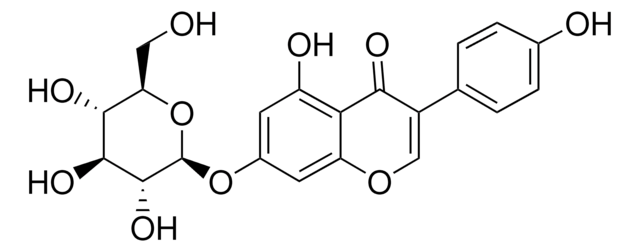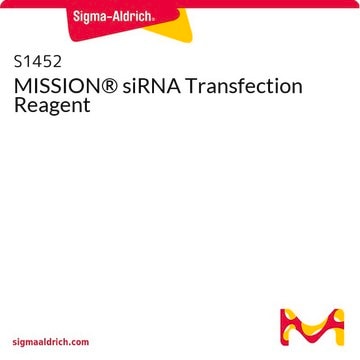About This Item
Fórmula empírica (notación de Hill):
C33H59N11O11
Peso molecular:
785.89
Código UNSPSC:
51111800
NACRES:
NA.32
Productos recomendados
Análisis
≥95% (HPLC)
formulario
lyophilized
composición
Peptide Content, ≥75%
condiciones de almacenamiento
protect from light
temp. de almacenamiento
−20°C
Amino Acid Sequence
Pro-Ala-Ala-Thr-Ala-Arg-Leu-Ser
Aplicación
Kisspeptins are a family of peptides encoded by the KISS-1 gene that are involved in GPR54 mediated cell signaling. Kiss-1 gene products are involved in metastasis suppression and the regulation of gonadotropin-releasing hormone (GnRH) secretion. A variety of kisspeptin peptides are available for use to study their unique functions.
Código de clase de almacenamiento
11 - Combustible Solids
Clase de riesgo para el agua (WGK)
WGK 1
Punto de inflamabilidad (°F)
Not applicable
Punto de inflamabilidad (°C)
Not applicable
Certificados de análisis (COA)
Busque Certificados de análisis (COA) introduciendo el número de lote del producto. Los números de lote se encuentran en la etiqueta del producto después de las palabras «Lot» o «Batch»
¿Ya tiene este producto?
Encuentre la documentación para los productos que ha comprado recientemente en la Biblioteca de documentos.
E Papaoiconomou et al.
In vivo (Athens, Greece), 25(3), 343-354 (2011-05-18)
The Kiss-1 gene encodes a secreted protein that is proteolytically cleaved to produce a number of structurally related peptides, with high interspecies conservation, globally termed kisspeptins. The original niche for the role of kisspeptin in human physiology is derived from
Rafael Pineda et al.
Progress in brain research, 181, 55-77 (2010-05-19)
Reproductive maturation and function are maintained by a complex neurohormonal network that integrates at the so-called hypothalamic-pituitary-gonadal (HPG) axis. This system is hierarchically controlled by the decapeptide, GnRH, which in turn is under the dynamic regulation of multiple stimulatory and
Jenny Clarkson et al.
The Journal of neuroscience : the official journal of the Society for Neuroscience, 28(35), 8691-8697 (2008-08-30)
Kisspeptin and its receptor GPR54 have recently been identified as key signaling partners in the neural control of fertility in animal models and humans. The gonadotropin-releasing hormone (GnRH) neurons represent the final output neurons of the neural network controlling fertility
Naresh Kumar Hanchate et al.
The Journal of neuroscience : the official journal of the Society for Neuroscience, 32(3), 932-945 (2012-01-21)
Reproduction is controlled in the brain by a neural network that drives the secretion of gonadotropin-releasing hormone (GnRH). Various permissive homeostatic signals must be integrated to achieve ovulation in mammals. However, the neural events controlling the timely activation of GnRH
Nuestro equipo de científicos tiene experiencia en todas las áreas de investigación: Ciencias de la vida, Ciencia de los materiales, Síntesis química, Cromatografía, Analítica y muchas otras.
Póngase en contacto con el Servicio técnico






